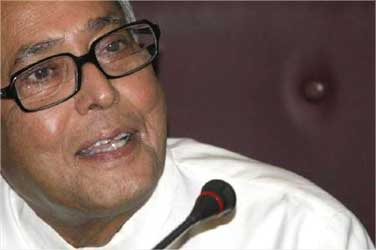 | « Back to article | Print this article |
Experts' view on what Pranab's Budget means
Budget attempts to address four core issues
We firmly believe that the Budget is positive for improving fiscal conditions, promoting economic growth & efficiency in the system and encouraging inflow of relatively more durable foreign capital.
It has also reiterated several visionary statements - hence, we believe that post-budget, there would be many concrete actions from the government, which would help the Sensex to get back to 21,000 level as early as possible in this calendar year.
We believe that the Budget attempts to address four core issues viz., strengthening the fiscal conditions, promoting growth & productivity and attracting relatively more durable foreign capital.
Improving fiscal conditions: While widening of service tax net along with robust growth of the service sector expected to increase service tax revenues by 18% in FY12 over budget estimates of FY11, continued robust growth of overall economy and significant tax buyoncy are expected to grow gross tax revenues by about 25%.
Consequent improvement in fiscal conditions (in terms of significant fall in both fiscal deficit and revenue deficit) would go a long way in improving the sentiments of foreign investors towards the domestic equity.
Growth-related measures: Increasing FIIs limit in infrastructure debt funds to $25 bn, attaining about 100% growth (over previous five year plan) in XI Five Year Plan outlay, increasing infra spend by 23% and aiming to increase farm credit by 23% are certainly pro-growth measures.
Measures for promoting Productivity, Efficiency in delivery mechanism, containing inflation and reform measures: Proposal such as a committee to look into expenditure management, nutrient-based urea policy, 5-fold strategy to tap black money, increasing interest subvention for timely repayment of farm loans, IT-backbone for the rural areas, increased investments for cultivation of edible oil seeds, direct transfer of subsidy through smart cards and significant investments in cold storage and warehouses for agri-crops would help in improving delivery mechanism in the agricultural sector and containing food crop inflation.
Attracting foreign capital: Proposal to allow foreign investments in equity schemes of mutual funds, increasing foreign investment limit in infra debt funds, firm policy guidelines for new banking licenses by Mar 2012 and decision to continue discussion on FDIs would improve the flow of relatively more durable foreign capital into the domestic economy.
Composition of foreign capital, which has been adversely impacted due to rising share of FII inflows is likely to change in more durable in nature due to these measures going forward.
Long-term visionary statements: Apart from concrete proposals, the budget also contains certain positive long-term plans like accelerating the share of industrial GDP in total GDP to 25% from the current level of 16% in next 10 years, improving agricultural productivity in the eastern part of the country, strengthening public debt management, etc.
In totality, we believe that this budget has taken and / or committed to favorable measures for faster economic growth, improved fiscal conditions & transparency in government administration, accelerating inflow of relatively more durable foreign capital and containing inflation.
Hence, we expect the domestic equity market to come out of current bearish sentiments soon and breach, for the third time, the Sensex level of 21,000 level in this calendar year itself. The risk to our view would be any failure of monsoon and/or the problem in Libya spreading to other oil-producing countries.
Mr Chokkalingam is ED & CIO ofCentrum Wealth Management.
Click NEXT to read on . . .
Experts' view on what Pranab's Budget means
Budget did not outline anything on a separate tax exemption limit for life insurance
I would like to commend FM on reducing the fiscal deficit to 4.6%.
It appears to be based on a very modest rise in government spending for the next year. He has maintained a balance between fiscal consolidation and driving growth, in spite of all the constraint.
The intention to push through the Parliament a number of pending bills (GST, DTC, Insurance, PFRDA etc.) and move towards direct transfer of cash subsidy in fuel and fertilizer for people below poverty line is a positive step.
Allowing FIIs to invest in MFs directly is innovative. I think the devil or angels are in the details so they need to be studied.
The Budget however, lacks clarity on any specific measures to curtail black money. There was neither any significant movement on reforms nor any big ticket idea, to catalyze growth. There seems to be a continued tendency to tinker at both indirect and direct taxes and increase in excise duties that will have a negative impact on prices of goods.
Overall, a practical budget though a bit timid on giving any direction on further reforms, but given the constraints did not expect anything better anyway.
From a life insurance perspective
The budget did not outline anything on a separate tax exemption limit for life insurance. We expected a separate limit of Rs.50,000/- for the life insurance premium, apart from the deduction u/s 80C of Rs.1 lakh and Rs.20,000/- for Infrastructure bonds.
Availability of separate tax exemption for life Insurance premium would have encouraged penetration of a long-term product such as life insurance. Currently, the total tax savings such as PPF, Life insurance premiums, PF contributions, National Savings Certificates etc are covered under Rs.1 lakh limit u/s 80C of the Income tax Act.
The time limit of 8 years is available for carry forward of tax losses, the same should have been relaxed for life insurance companies, since this Industry has a very long gestation period of 8 to 10 years. However, that did not happen.
There are changes proposed in the levy of service tax payable by insurance companies. On both conventional plans as well as ULIPs, increased service tax becomes effectively borne by the policyholder.
Amitabh Chaudhry is MD & CEO of HDFC Life
Click NEXT to read on . . .
Experts' view on what Pranab's Budget means
Budget focused more towards controlling inflation, fiscal consolidation and focus on rural as well as agriculture sector
The Union Budget, I would say, has been focused more towards controlling inflation, fiscal consolidation and focus on rural as well as agriculture sector.
Series of reduction in excise duty and customs duty seem to be targeted more towards keeping the inflationary expectation down in the coming year. Fiscal consolidation is reflected through the budgetary provision towards reduction in the overall expenditure.
No major efforts have been put to augment revenue. However, expenditure control has been put in place especially with respect to subsidy burden. However, our initial assessment is that this number might overshoot by Rs 40,000 - 50,000 crore (Rs 400-500 billion) during the course of the year.
Budget has of course highlighted various initiatives such as FRBM act implementation, creation of Debt management cell, rolling out policy for attracting FDI investment, various pending legislation to be taken in the forthcoming Parliament session such as Insurance Law, Life Insurance Bill, Pension Bill, Banking Law amendment and Bill to amend RDBFI Act and SARFAESI act.
Finally, the long pending proposal to reduce withholding tax for investment in Indian debt by FIIs is a very welcome move. On top of it, increasing the limit to $40 billion from the current level of $20 billion and also allowing them to invest in Unlisted Debt securities is a very welcome move.
This is very essential under the current interest rate environment and also the current need for funding the various infrastructure projects that need investment in the SPVs.
In our view, this is a big positive to attract global investors into Indian debt given the high interest rates. Mutual Fund industry is finally getting due recognition by opening up the industry for Foreign investors to invest in Indian Growth story through domestic mutual fund equity schemes.
This is a path breaking initiative, however, this will be subject to completion of KYC stipulated by Indian Regulator as well as local law that is applicable at the investing countries.
To sum up potential upside risk still remains for our market in the form of high inflation, fuel prices moving beyond acceptable levels and monsoon risk which the market and investors will start looking at in coming months. All three factors play an important role especially with the government stance of reduction in expenditure budget.
A Balasubramaniam is CEO of Birla Sun Life AMC
Click NEXT to read on . . .
Experts' view on what Pranab's Budget means
Budget provides fillip to the growth of the Indian mutual fund industry
The pronouncement by the Finance Minister in Union Budget 2011-12 to allow KYC-compliant foreign investors to invest directly in equity schemes of SEBI registered mutual funds provides a fillip to the growth of the Indian mutual fund industry.
This would enable Indian capital markets to access disposable fund surpluses of global retail investors and allow foreign investors to participate in the Indian growth trajectory.
We expect Indian fund houses to design innovative products compatible with regulatory guidelines and establish new delivery channels for targeting this customer segment.
The presence or the extent of the international linkages shared by domestic AMCs with their international partners (wherever applicable) would in our opinion, be one of the key success factors in this initiative.
Sushmita Ghatak is Executive Director & Chief Operating Officer of ICRA Online
Click NEXT to read on . . .
Experts' view on what Pranab's Budget means
It's a lack-lustre Budget, 'a missed opportunity'
The Union Budget 2011-12 has indeed some good features but, on overall analysis there seems to be more a lip service than specifics so far as tightening of the country's loose governance systems, improving the competitiveness of its economy, and holding out hopes of effectively tapping its anticipated demographic dividend are concerned, says Indian Merchants' Chamber.
In a press statement issued close on the heels of presentation of Union Budget by the Finance Minister, Mr. Pranab Mukherjee, today the IMC President, Mr. Dilip Dandekar, said the Budget had indeed extended benefits to the common people by raising tax exemption limits, by offering interest subvention on loans and direct subsidies on fertilizers to the rural sector also some peace of mind to the business community by holding the tax rates at the existing moderate levels.
"But I find nothing substantial in the Budget that would tackle the widespread corruption and improve effectiveness of administration. The creation of a new 'Group of Ministers' to address these issues does not inspire confidence, if we go by the past record," Mr Dandekar said.
Turning to specific areas, Mr. Dandekar said that the business community would welcome reduction of foreign dividend tax rate to 15% for Indian companies, cut in surcharge on companies from 7.5% to 5%, but, on the other hand, the introduction of MAT on SEZ units is unwelcome.
Similarly, individual tax-payers would laud the Budget for raising the income level of tax exemption from Rs 160,000 to Rs 180,000 and also for lowering the senior citizens age criteria from 65 years to 60 years.
"Besides raising the tax exemption limit from Rs 240,000 to Rs 250,000 for senior citizens, Mr. Mukherjee has raised tax exemption limit to Rs 500,000 for all octogenarians, which is commendable," the IMC President said.
Referring to macro features of the Union Budget, Mr. Dandekar said the Finance Minister's claim to credit for reducing the fiscal deficit to 4.6% from 5.4% should not be taken seriously, because the fiscal deficit got narrowed mainly due to increased volume of GDP, buoyed by high inflation.
Mr Dandekar said that the market had good reasons to be happy, because the Finance Minister had widened avenues for investment by both FIIS and FDIs in some critical sectors such as infrastructure.
"But, overall we cannot escape the feeling that the Union Budget has not done much to rise to the occasion by introducing effective measures to rein in the galloping inflation and the contagion of corruption, and to bring in transparency and accountability to the governance structure," the IMC President said.
Dilip Dandekar is president of IMC
Click NEXT to read on . . .
Experts' view on what Pranab's Budget means
March towards inclusive growth
The Madras Chamber welcomes the broad thrust of the Finance Minister's Union Budget proposals. It is to be hoped that the increased outlay for social and farm sector development would help the march towards " inclusive growth".
The indication that the fiscal deficit for 2010-11 is likely to be 5.1% as against the originally estimated 5.5% and an even lower figure of 4.6% for 2011-12, is indeed heartening in the context of fiscal consolidation.
The renewed impetus that has been proposed for the manufacturing sector is particularly welcome. The proposal to introduce a National Manufacturing Policy is particularly noteworthy. The retention of the excise duty and service tax rates at the existing level is equally notable, especially viewed in the context of pre-budget expectations to the contrary.
The increase in allocation for Skill Development though various programmes of Central Government, the various green-friendly initiatives, the increase in the weighted deduction for R&D expenditure from 175% to 200% are all steps in the right direction.
In the area of financial sector reforms, the FM has indicated that Bills relating to the insurance sector, banking sector and the pension sector would be introduced shortly. He has also made a reference to the introduction/enactment of the Public Debt Management Bill during the current session of the Parliament as also a slew of other Bills such as Companies Bill, the Stamp Act, DTC and GST.
All of these have been on the anvil for quite some time and if they are indeed introduced in the current session, it would be an extremely positive step.
The proposals to permit foreigners to invest directly in domestic mutual funds as well as the increase in the limits for FII investment in corporate debt are steps in the right direction.
The various proposals relating to housing sector will provide the much needed fillip to this crucial infrastructure sector and encourage banks and housing finance institutions to step up their lending to this vitally important sector. The setting up of a Central Electronic Registry to prevent double financing is also noteworthy.
The Chamber also welcomes the commitment of the Government towards speedier refund of service tax and the introduction of self assessment of customs levy as this would reduce transaction cost , if properly implemented.
While the increase in MAT rate from 18 to 18.5%, combined with reduction in surcharge from 7.5% to 5% will be largely tax neutral, non-MAT companies will benefit from the reduction in surcharge. However, with indirect taxes projected to bring in Rs 11300 crores additionally, the cascading effect of this increase on prices of various commodities and services is likely to adversely impact inflation, which is an area of concern.
It is however significant that the two issues which were top of mind for the average citizen, namely black money and inflation, do not seem to have received adequate attention, though they found passing mention in the Finance minister's speech.
T T Srinivasaraghavan is President of The Madras Chamber Of Commerce & Industry.
Click NEXT to read on . . .
Experts' view on what Pranab's Budget means
The Budget can be termed as growth oriented & has taken incremental measures to boost investment into housing, infrastructure and social sector
Commenting on Union Budget 2011-2012, Mr. Navneet Munot - CIO, SBI Mutual Fund said, "Given the macro challenges and political compulsions, the finance minister has done a fine balancing job.
Keeping deficit under check without imposing additional tax burden and staying away from any populist largesse is a big positive.
The budget can be termed as growth oriented and has taken incremental measures to boost investment into housing, infrastructure and social sector.
Firm targets on roll out of GST, DTC, issuance of new bank licenses and move towards cash subsidies are encouraging. Quantum increase in limit for FII investment in infrastructure bonds and allowing foreign investors to invest in domestic mutual funds are bold moves towards liberalizing the capital account.
Fiscal deficit at 4.6% of GDP and net market borrowing number for the next year are better than market expectations and will sooth fears of crowding out and sharp spike in interest rates.
Measures on the taxation and spending in key programmes would keep the consumption story intact while some visible moves have been made to push infrastructure build up.
The long ranging reforms like roll out of GST, Direct tax code, financial sector reforms, subsidy reforms with better targeting through Unique identification Number will all assist in increasing the growth potential of Indian economy.
Though no major surprise, budget should be taken positively by both equity and the bond market. As the event is behind us, the market would now focus on cues from global markets and incremental economic data and corporate earnings."
Navneet Munot is CIO of SBI Mutual Fund
Click NEXT to read on . . .
Experts' view on what Pranab's Budget means
The FII limit in corporate bond market will have a positive impact on the corporate bond market, which is in the developing stage
"The Union Budget FY2011-12 has bought some cheer to the markets in spite of the fact that the same was presented in the backdrop of negative macro-economic factors.
The government's measures to curb inflationary pressures and fiscal consolidation are a step in the right direction.
The huge emphasis given to the rural economy and the infrastructure space will help in maintaining a GDP growth of above 8.50% even if there are some concerns on the external and internal front in the short term.
Although the FII limit in corporate bond market is a boon for the infra space, we believe that this huge inflow will have a positive impact on the corporate bond market, which is in the developing stage.
Finally, the fact that mutual funds are going to be open for foreign investors will provide opportunities to those who wanted to participate in the India growth story through the mutual funds route.
This will also help the fund houses to increase their volumes in an environment in which they have been badly hit due to the abolition of entry loads."
Renu Pothen is Research Manager of Fundsupermart.com India
Click NEXT to read on . . .
Experts' view on what Pranab's Budget means
The opportunity to announce key and widely expected FDI policy changes in sectors like insurance or multi-brand retail was lost
Overall, the budget as exercise has been a reasonable one. A major positive for us was that the Government has refrained from taking a populist approach at a time when it seems embattled on most fronts.
It was a concern from the financial markets perspective and we seemed to have crossed it safely with slight positives from an interest rates and infrastructure financing perspective.
The macro uncertainty has to some extent been dispelled and investors can get back to focusing on specific investment opportunities on a more micro-basis.
Positives
Fiscal consolidation - The targeted fiscal deficit number for 4.6% of GDP is in line with our expectations, but much lower than what markets expected.
Also, the net borrowing figure of Rs 340,000 crore is at least a good Rs 60,000 crore short of market expectations and positive for bond yields. Positive for both bonds as well as equities.
No rollback of excise rates and broadly untouched direct tax regime - Most steps were towards aligning the tax regime to the DTC and the GST.
Infrastructure financing - Increasing the FII limit for corporate bonds significantly as well reducing the withholding tax on that to 5% should go a long way in allowing infrastructure financing to happen at globally competitive rates.
Concerns
Bringing of SEZ units as well as LLPs under MAT This move takes away a significant attraction of both SEZs and LLPs.
No big moves in FDI regime - The opportunity to announce key and widely expected FDI policy changes in sectors like insurance or multi-brand retail was lost.
While the budget may not be the only forum to announce these measures, these announcements would have sent strong positive signals on the government's reformist intent.
DDT on Debt MFs - The higher rates of DDT on money-market funds and also other debt funds has almost eliminated the tax arbitrage for investors, especially corporates.
This move, though not announced in the speech, will hurt the asset management business significantly. So while they cheered the ability of foreigners to invest directly into onshore equity MFs, this will be a big blow.
Amit Rathi is MD of Anand Rathi FInancial Services Ltd
Click NEXT to read on . . .









